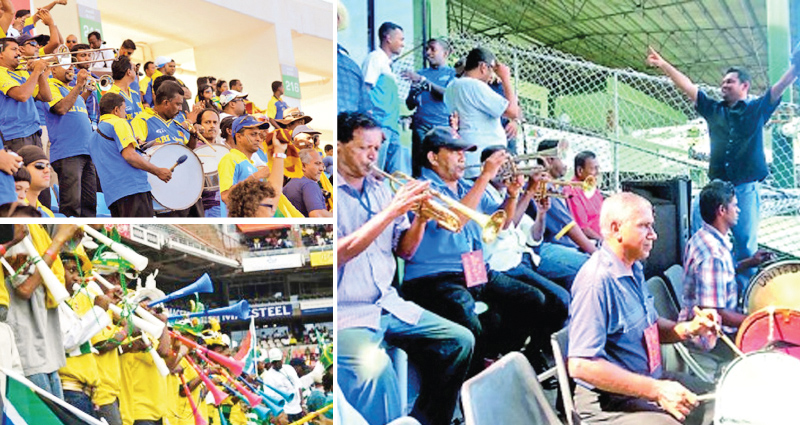Papare is one word that any Sri Lankan would no doubt know without having to think twice that would cause their energy level to rise up in response.
Be it at the annual school big matches, at club cricket matches, national and international Cricket venues including One Day International and T20 Cricket World cups, and at any type of Cricket Carnivals, no Cricket match is complete without Papare bands and Papare music. In fact, one cannot talk about Sri Lankan Cricket without Papare as the non-stop merry music infuse such high level of energy in the whole atmosphere that keeps the fans and the players alike in high spirits throughout the game. Papare has its own unique identity in Sri Lankan Cricket that is well renowned to boost up the Sri Lankan supporters as well as the opposition side. It is such a lively music which has by now become a very popular music culture throughout the South Asian region.
Origins of Papare music
Did you know that Papare was originated in Sri Lanka, and its origins date back long before Cricket was ever known or introduced to this world as a sport? This very lively and popular music culture according to the school of thought suggests that Sokkali, which was an oppressed cast, developed it to worship their Gods. The second commonly held notion puts the origin as Negombo, associating it with festivals that were held in at church and wedding ceremonies. In both instances, it was used as a tool to draw crowds together for the celebration and soon became very popular among all walks of life. Papare music has a distinct connection to Kaavadi music played in religious processions by the Sri Lankan Hindu and Sinhala Communities for dancers to pay homage to their Gods that generates a high physical, emotional and spiritual energy within them as well as around them among the spectators.
However, what started as a tool to draw crowds to worship their Gods, to draw people to church and wedding ceremonies, soon became the signature trademark of every Sri Lankan Cricket match both in Colombo and rural areas. As a matter of fact, Papare has by now become an important element of even high profile weddings held in five star hotels and any type of parties, birthday celebrations and many other occasions that gets even the most conservative, dignified middle aged and old ladies and gentlemen to leave their seats and start dancing and whistling and what not. The attention and the excitement are visible as the crowd becomes hypnotized by the sound and the beats.
Young Kids, middle aged men and women, elderly couples and everyone else dance continuously, and to those who are watching them sometimes it appears as if the occasion itself is merely incidental. It generates an infectious fever and vibe in the whole atmosphere; the moment the music and the beats begin that spreads rapidly across the surrounding which causes everyone to forget where they are and what they came for. The only thing they want to do from then onwards is either dance, whistle, clap and tap on anything they can lay their hands on.
Papare band and instruments
A usual Papare band consists of instruments such as the base drum, the side drum and the trumpet which are the core instruments used with a minimum of three members required to get the band going. However, sometimes the number of members in a band can even go up to around 15 to 20 as the more the people in the band, the higher becomes the spirit.
Despite the fact that the band members play in shifts, the stress and strain of holding the instruments and playing them for many long hours continuously, does not show.
Evolution of Papare
In the good old days the Papare bands consisted of mostly unemployed very poor people with musical talent, grouping together to earn a pittance to add to contribute to their daily bread and could be seen mostly in their sarongs in the big matches and other Cricket venues. But in the present day and age, the Papare band has evolved with time and musically talented and skilled professionals, mostly pensioners form groups with their colleagues and offer Papare music as a professional entertainment for any type of occasion that demands higher payments for their services rendered. They have continuous bookings and are high in demand due to diversifying their entertainment besides Cricket to any type of celebrations, offering their services to suit all income levels to suit their budgets.
The Papare bands that were once restricted only to the Cricket matches held locally, are now booked by the Sri Lankan Cricketing fans living abroad, way ahead of time for every Cricketing event held overseas that involves any of our Sri Lankan teams. Therefore, Papare band schedules in the present day include many foreign tours in their calendar.
The once nearly banned unique mode of entertainment that Sri Lankan Cricket cannot be identified without, on the eve of the ICC Cricket World Cup 2011, Papare has survived through time and obstacles that opposed it by the sheer will power demonstrated against such moves by the Sri Lankan fans both here and abroad raising one formidable voice for their most favorite form of music.
As the annual College Big match fever crescendos, without a doubt, one can proudly say that Papare has come here to stay.



Add new comment